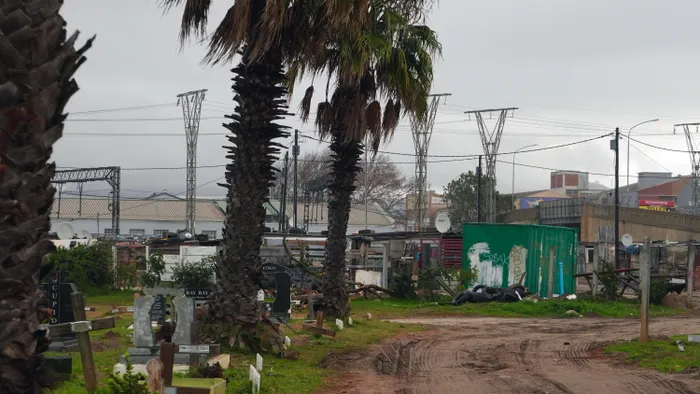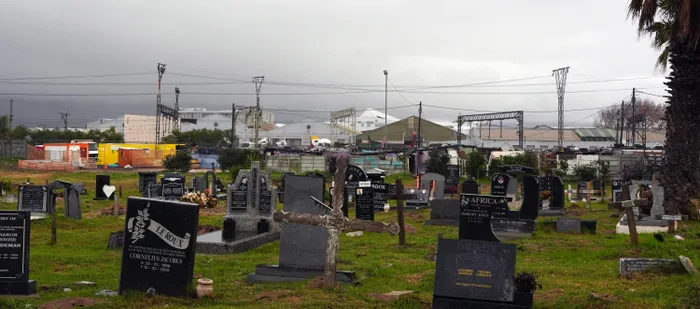City faces backlash over Ghost Town relocation plans

Residents are opposing the City’s plan to expand the Ghost Town informal settlement located next to Maitland Cemetery, set to accommodate an additional 60 families relocating from Salt River.
Image: Ian Landsberg
The Ken-Fac Residents and Ratepayers Association are vehemently opposing the City of Cape Town’s plan to expand the Ghost Town informal settlement at Gate 1 of the Maitland Cemetery, which is apparently set to accommodate an additional 60 families relocating from Salt River.
Ward 56 councillor, Cheslyn Steenberg, has since publicly apologised for the decision, saying he did not properly consult with residents.
Mayor Geordin Hill-Lewis, together with Steenberg, is set to provide a live broadcast at 7pm today(wed) on Facebook regarding feedback on issues including the Ghost Town informal settlement saga, developments in Kensington and Maitland, and the Wingfield Refugee tent.
In response to the opposition by the ratepayers, mayco member for Human Settlements, Carl Pophaim, said an "upgrade" of the informal settlement would be taking place, which would include relocation opportunities.
“The City seeks to undertake a formal upgrade project at what is known as the Ghost Town informal settlement,” he said.
“The settlement has existed for many years in an undignified condition.
"Through this upgrade, formalised basic services and alternative building technology homes will be provided on a 1:1 basis.
“Surplus opportunities will be utilised for pressing relocation needs.
“The upgrade project will ensure a safe and well managed settlement taking all substantive comments raised into consideration as well.”

Residents are opposing the City’s plan to expand the Ghost Town informal settlement located next to Maitland Cemetery, set to accommodate an additional 60 families relocating from Salt River.
Image: Ian Landsberg
The residents claim there was a failure to consult or obtain consent from affected persons, property owners, and civic organisations.
The association said property owners already had to cough-up towards the payment of informal settlements and that not discussing the plans with them was a slap in the face.
It is understood the informal settlement, located next to the cemetery, is already home to 30 or so families while the community is also home to refugees and foreign nationals living in the so-called White Tent, located opposite the grave yard.
“Property owners have had absolutely no say yet 14 cents of every R1 in property rates paid to the City finances infrastructure projects with respect to informal settlement upgrades,” they said.
“We are deeply concerned by reports that more than 60 families currently residing in Salt River Bridge are to be relocated to the Gate 1 (Ghost Town) informal settlement site, currently home to over 30 families without any form of public engagement or transparency.
"This plan is allegedly being framed as an 'upgrade', yet it does not address or prioritise the dire housing needs of unhoused individuals already within Ward 56.
"The Ghost Town informal settlement, situated at Maitland Cemetery (Gate 1) along Voortrekker Road between 4th and 5th Avenues, has grown unchecked.
“The City’s unilateral decision to further increase its population exacerbates existing service delivery, infrastructure, and safety concerns in our community.”
“During the Covid-19 pandemic, the City erected a large tent in Voortrekker Road, Wingfield, to house homeless refugees from the CBD. That 'temporary' structure remains, and two additional informal settlements have since emerged around it.
“Similarly, the 18th Avenue informal settlement now accommodates over 300 families, largely of former backyard dwellers from Factreton.
"Several other settlements are inhabited by individuals from outside the community and even from outside the province. The unchecked growth of these settlements reflects the City’s failure to deliver economic housing to those on its waiting lists,” they said.
Their demands include: full transparency from the City; an immediate halt to all relocations into the area until proper community engagement and participatory planning is undertaken; a formal meeting with City leadership; and no informal settlements along the critical arterial Voortrekker Road.
Steenberg told the Cape Argus he had commuted with Pophaim's office and apologised for his decision making and promised more transparency.
“I want to acknowledge the concerns and disappointment expressed by members of our community regarding the recent decision to accommodate squatters from Salt River. I understand that this decision was made without proper consultation with our community, and for that, I apologise,” he said.
“I want to assure you that my intention was to benefit the existing residents of Ghost Town with services. I recognise that this decision may have caused concerns and uncertainty among some community members. My primary concern was to alleviate the dire conditions of the people living in Ghost Town.”
Councillor Ian McMahon of Salt River said it was not for his office to respond on the relocation and directed the publication to Pophaim’s office.
Get your news on the go, click here to join the Cape Argus News WhatsApp channel.
Cape Argus
Related Topics: